Arch rivals: India and Pakistan end 2015 on high note
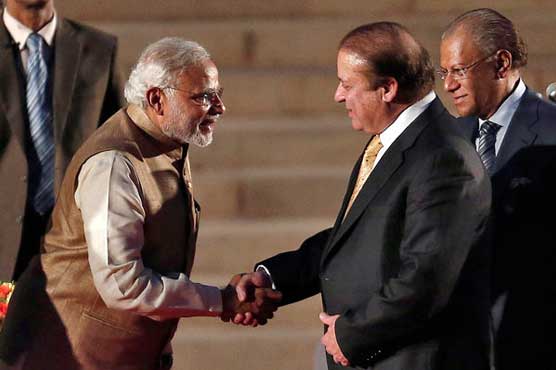
Ties between the neighbours worsened since Hindu nationalist, Narendra Modi took office
LAHORE (Web Desk) – Relations between Pakistan and India have significantly bettered by the end of 2015 while tensions between the two arch rivals were nowhere near to closure all through the year.
Ties between the neighbours worsened since Hindu nationalist, Narendra Modi took office of the Prime Minister of India on May 26, 2014.
In November 2014, India media and the Ministry of External Affairs kept going back and forth on likelihood of Modi’s meeting with Pakistani counterpart on sidelines of South Asian Association for Regional Cooperation (Saarc) summit in Nepal.
Indian foreign department stated that Modi-Nawaz meeting has not been ruled out completely. On the other hand, an India official stated that Modi would meet every leader at the summit but Nawaz Sharif. And none knows what that statement meant. Did the statement refer to Prime Minister of India, a country that neighbours Pakistan?
Modi gave cold shoulders to Nawaz until the summit was close to an end. Nawaz and Modi finally shook hands and exchanged greetings in a brief couple of minutes in Nepal.
.jpg)
However, the handshake did not result in significant betterment of bilateral relations.
During tenure of the last government, Kashmir issue was frozen and was off the policy by Pakistan People’s Party Parliamentarian (PPPP).
However, as soon as Nawaz Sharif took the office in May 2013, it was brought back on the charts.
In the early 2015, United States (US) President Barack Obama visited New Delhi and showed his support for India’s inclusion in the Nuclear Suppliers Group (NSG). The US President’s visit was not taken well by Pakistan as authorities maintained that US-India defense cooperation would sustain the imbalance there is in South Asia.
.jpg)
Since the start of 2015, Indian Border Security Force (BSF) opened unprovoked fire dozens of times across the Line of Control (LoC) and the Working Boundary. Several security personnel embraced martyrdom while dozens of locals including children and senior citizens lost lives in series of Indian shelling.
Know more: India violated ceasefire 997 times since 2013: Defense Ministry
Both the countries summoned high commissioners repeatedly to lodge protest against unprovoked firing. One time when Pakistan’s envoy to India, Abdul Basit was called to the Ministry of External Affairs against alleged unprovoked firing by Pakistan Rangers along the border, he stated that the BSF had violated truce more than 70 times in July and August alone.
Against unprovoked firing, Pakistan moved to the United Nations Military Observer Group in India and Pakistan (UNMOGIP) in August and lodged a protest. The sectors that saw bloodshed at hands of Indian BSF include Nakyal, Sialkot s Chaprar, Rawalakot s Neza Pir, Shakargarh and others.
Know also: Pakistan raises issue of India s ceasefire violations at UN
On February 13, Narendra Modi and Nawaz Sharif conversed over a telephone call while the premiers called on at least three times more in the months that followed on occasions including Ramzan and Nepal earthquake.
In July, Narendra Modi and Nawaz Sharif met at a dinner hosted by Russian President Vladimir Putin in Ufa. Following the dinner, a hall was booked the next morning for a scheduled meeting between the two leaders.
Reports stated that Modi had termed release of 26/11 Mumbai attacks key roleplayer’s release a stumbling block every time efforts to normalize relations are made.
Nawaz, after Modi mentioned the Mumbai attacks agreed that trial of the terror plot must be sped up. It was then in Ufa that the premiers vowed to hold a National Security Advisor-level (NSA) meeting in the next month.
China-Pakistan Economic Corridor (CPEC), a $46 billion investment in Pakistan was an eye-opener for India in 2015. The massive foreign investment by China in India’s rival definitely was not easily digestible.
Narendra Modi held a 90-minute long meeting with Chinese President Xi Jinping on July 9 in Russian Ufa and tried to sabotage the agreement that would change Pakistan’s outlook and infrastructure in the years to come. Modi apparently informed Jinping about reservations that India has over China investing in Pakistan.
Modi also expressed concern over China blocking India’s move at the UN on the Lakhvi issue.
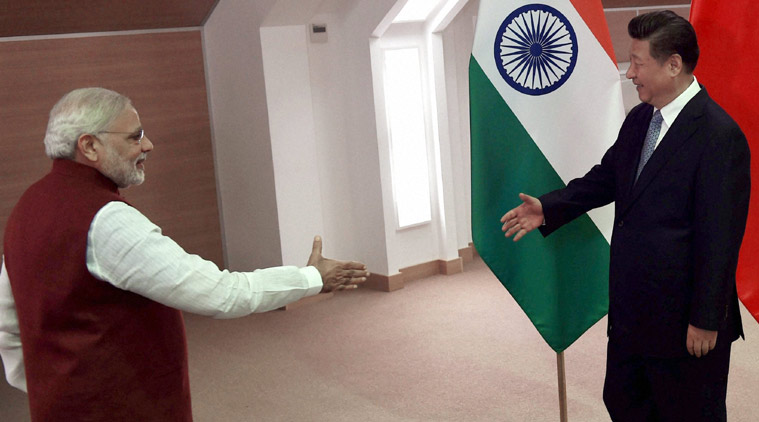
In August, meeting between National Security Advisors (NSA) of the two sides was arranged however, India called the dialogue off as Pakistan’s Advisor to Prime Minister on Foreign Affairs and National Security Sartaj Aziz and envoy to India, Abdul Basit were scheduled to meet All Parties Hurriyat Conference (APHC) leaders.
Since Nawaz-led government had put Kashmir issue among others back on the table toppling Zardari’s policy which was more about visas and transportation between the neighbours, Sartaj Aziz was to convene a meeting with Syed Ali Gilani, Mirwaiz Umar Farooq and others.
Soon after the dialogue was confirmed to be held in Indian capital, reports about Aziz’s meeting with APHC’s leaders surfaced that staunchly concerned India.
Modi government put forth a condition to hold talks. The condition was as baseless as Hindu nationalists’ hatred for Pakistan. Pakistan’s NSA was barred from meeting the Hurriyat leaders and was demanded to avoid discussing Kashmir issue.
Sartaj Aziz’s various statements that followed India’s move clearly showed that Pakistan was not willing to give up on Kashmir talks. Meanwhile, India did not budge and took the dialogue off the charts.
In May, Modi used cricket diplomacy to break the ice. He put forth recommendation of holding a cricket series between the two nations hoping that it will cause some kind of movement in the standstill scenario.
Not to mention that Board of Control for Cricket in India (BCCI) has maintained a non-serious attitude throughout the year of proposed sports diplomacy. In December, Pakistan Cricket Board (PCB) Chairman Shehryar Khan finally gave up on the pigheaded neighbouring cricket authority which kept on delaying a decisive stance hinting nothing but the longstanding irrational hatred towards Pakistan.
During the course of stay in New York to address the United Nations (UN) General Assembly’s 30th session in early October, Modi and Nawaz took up suits in same hotel but neither of the two saw each other.
Indian Foreign Minister Sushma Swaraj did not hold back from critising Pakistan and terming India a victim of alleged Pakistan-sponsored terror.
In her speech at the General Assembly, Swaraj said that India has been a victim of terrorism and is willing to resolve issues through talks however, Pakistan does not create an environment that is favourable to dialogue and amounts to fruitful results.
Prime Minister Nawaz Sharif, in his UN General Assembly address raised Kashmir issue and assured participants of the international gathering that Pakistan would hold up its side for conclusive efforts towards better relations with India and others in the region.
However, after Sharif’s address in New York, Indian media reported that Nawaz allegedly lied to the world and distorted reality of the matter. The media outlets criticised the fact that Pakistani Prime Minister’s entire speech revolved around Kashmir dispute. Amidst the judgmental views came a fairly rhetoric comment from former Indian ambassador who called an immediate respond terming Nawaz’s speech the first of its kind by any Pakistani premier in history.
Permanent Mission of Indian to the UN exercised its right to reply and stated that Pakistan has portrayed a false picture of the reality in the region. The statement issued by the Ministry of External Affairs of India stated that India has a reservation over China-Pakistan Economic Corridor (CPEC) only because it uses Indian territory “occupied” by Pakistan for years.
Indian First Secretary stated that Pakistan is a victim of its own terrorism-breeding. The statement alleged Pakistan of violating Simla Agreement 1972, Joint Declaration 2004 and also questioned the understanding of Pakistan with India at Ufa.
Responding to questions at a press conference after addressing the UN General Assembly session, Nawaz Sharif said that he had planned on handing over the dossier to his Indian counterpart Narendra Modi directly but that meeting did not take place. As such, a copy of the dossier would be forwarded to the UN chief.
When asked about his initiative about forging better ties with India, Nawaz had said that Pakistan has put forward concrete proposals for improving ties with India with the hope that it would elicit a positive response.
The Prime Minister said it was in the interest of both the sides that they withdraw troops from Siachin- the world s highest battle ground.
The dossier that was later handed over to the UN Secretary General Ban Ki-moon by Pakistan’s permanent representative to the UN contained evidences of Indian involvement in Karachi, Balochistan and other areas.
Know more: Dossiers on Indian involvement in Balochistan, Karachi submitted to UN: Aziz
Nawaz’s speech at the General Assembly did not only talk about Kashmir issue but he had put forth a workable solution to better ties with the neighbour, a four-point agenda.
Know more: PM Nawaz proposes 4-point solution to restore peace with India
India did not think twice to respond to the agenda with an obvious no.
In the following days of October, Pakistan Cricket Board (PCB) Chairman Shehryar Khan visited India on Board of Control for Cricket in India s (BCCI) chief Shashank Manohar s invitation. The visit sparked series of protests by extremist wing with political backing, Shiv Sena.
Know more: Shiv Sena workers storm BCCI office, protest against PCB chief
Indian cricket authority seemed helpless or apparently did not do enough to tackle the issue. Shehryar Khan was moved from Mumbai to New Delhi the same day as the meeting was postponed. Manohar was then scheduled to see his Pakistani counterpart there. However, Shehryar Khan returned with nothing concrete in his hands.
Hopes of using sports diplomacy to repair the ruptured ties still kept PCB and government going with the flow. Until the day when Shehryar Khan had to give a final call to India to make contact.
PCB chief’s visit to India and wait on Pakistan’s part did not draw anything but protests and postponements from India.
Politics alone could not contain Indian animosity. It had to seep in arts and entertainment. On November 4, folk and ghazal singer, Ghulam Ali’s concert was cancelled due to threats by Shiv Sena.
Know more: Ghulam Ali s concert cancelled in New Delhi
Although Delhi Chief Minister Arvind Kejriwal denounced the cancellation and invited Ghulam Ali to perform in December, the singer could not manage another tour amid threats and protests.
Pakistani showbusiness personalities who were subjected to Indian hatred and threats included Fawad Khan Mahira Khan among others.
Know more: Shiv Sena threatens Fawad Khan, Mahira
A year after the Kathmandu handshake, Indian journalist and host of NDTV s ‘The Buck Stops Here’, Barkha Dutt claimed in her book that the two premiers held an hour-long secret meeting in Nepal.
Know also: Nawaz Sharif, Modi had secret meeting during Saarc 2014, claims Indian media
The meeting was allegedly set up by Indian steel magnate Sajjan Jindal. Name of Jindal amid Modi and Nawaz attracted the nations’ eyes and hears. The people saw the two premiers as two businessmen who have nothing to do with countries’ interests. The leaders were slammed for putting their business interests ahead of those of the people.
However, the meeting was denied by Nawaz and his cabinet. Pakistan Muslim League-Nawaz (PML-N) members said that it is an attempt to tarnish Prime Minister’s reputation and has no truth to it.
On November 30, Modi and Nawaz were seen sitting together and shaking hands on the sidelines on Paris climate summit.
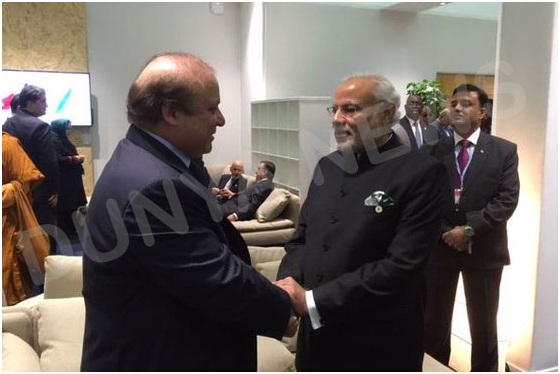
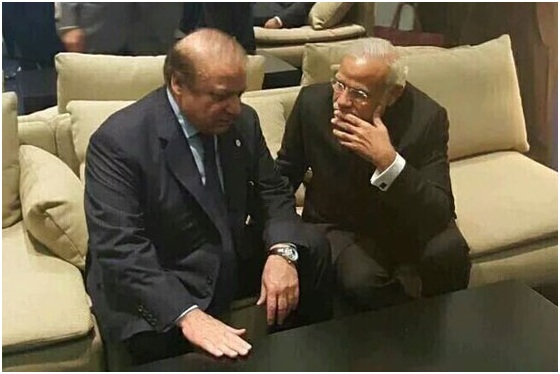
Know more: Nawaz Sharif, Narendra Modi meet in Paris
The informal Paris meeting had come three days after Prime Minister Nawaz Sharif said that Pakistan was ready for talks with India without preconditions. The premier had given these remarks during meeting with British counterpart David Cameron on the sidelines of the Commonwealth Heads of Government Meeting (CHOGM) in Maltese capital.
On December 8, Afghanistan president Ashraf Ghani kick-started Heart of Asia Conference Istanbul Process, in Islamabad. Indian delegation that took part in the summit was led by Foreign Minister Sushma Swaraj.
Swaraj, while talking to the media in Pakistan told that her parents were from Pakistan. The Indian delegation leader had brushed up her diplomacy skills before arrival in the federal capital.
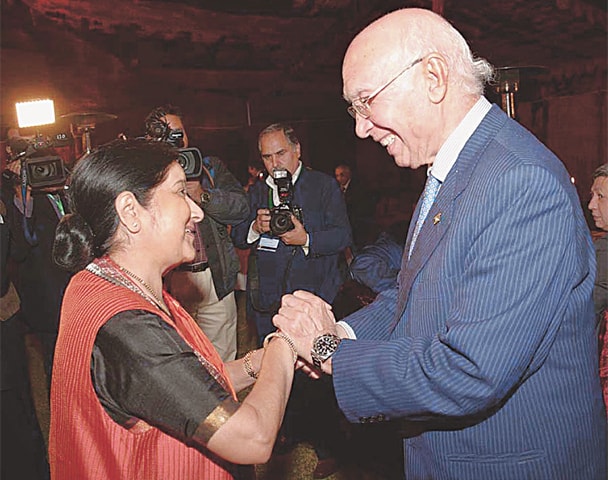
The difference was seen during to the Conference and on the sidelines when she held meetings with Sartaj Aziz and Prime Minister Nawaz Sharif. Swaraj vowed to continue talks on the outstanding issues including Kashmir, Sir Creek and others.
Swaraj’s vows hinted at India’s revised approach towards Pakistan.
Nawaz Sharif welcomed Swaraj’s move and cleared that Pakistan has always been in favour of dialogue with India.
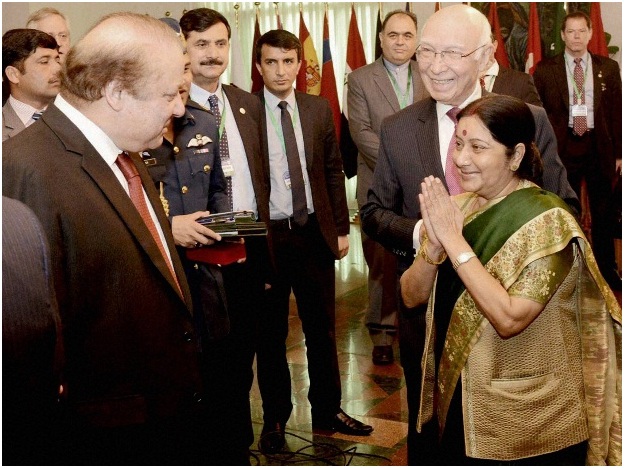
Know also: Nawaz, Ashraf Ghani kick-start Heart of Asia Conference in Islamabad
The year ended with a surprise visit by Narendra Modi to Pakistan. On December 25, the Foreign Office (FO) had stated that no meeting was scheduled however, arrangements were made once Indian Prime Minister expressed wish to see Pakistani counterpart.
Know also: Modi sends birthday wishes to PM Nawaz

Modi had met Putin in Russia and signed several deals including defence pacts. On his way back, the Indian Prime Minister made a daylong tour to Afghanistan where he addressed Afghanistan lawmakers at the Parliament after inauguration of the building that has been built with India’s funding.
Modi and Afghanistan President Ashraf Ghani vowed to better ties.
Interestingly, in a first of its kind of statement, Modi stated that Pakistan is key role player in restoration of peace in the region especially Afghanistan. He acknowledged Pakistan’s efforts to curb terrorism and utilizing resources for the cause.
Know more: Pakistan will play key role for peace in Afghanistan: Modi
On Modi’s way back to New Delhi, he landed at Allama Iqbal International Airport where Nawaz Sharif welcomed the surprise guest. Modi and Nawaz held hour and a half long meeting in Nawaz Sharif’s residence in Jati Umra.
Know also: Modi s visit: Is Sajjan Jindal behind the birthday diplomacy ?
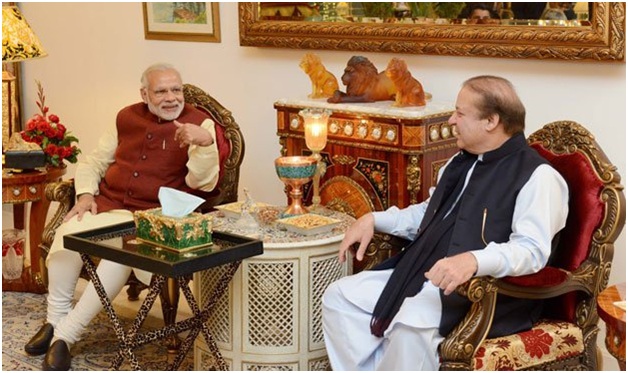
The meeting was once again denounced by some sections in Pakistan as tycoon, Sajjan Jindal was also present in Lahore at the time.
However, Pakistan’s opposition parties, with a couple of exceptions, welcomed Modi’s visit.
On December 29, outgoing Indian Indian High Commissioner Dr TCA Raghavan paid a farewell call on Prime Minister Nawaz Sharif in Islamabad.
The premier discussed matters of bilateral interest with the Indian envoy.
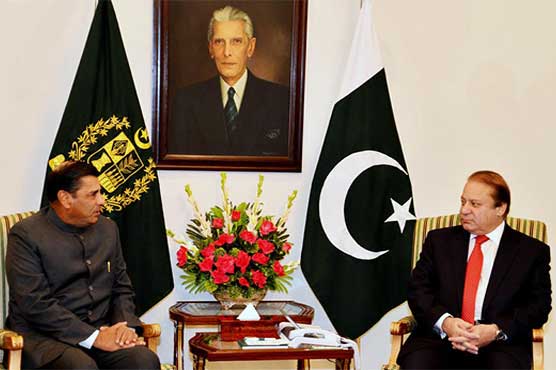
Know more: Outgoing Indian HC meets PM Nawaz in Islamabad
United Nations Secretary General Ban Ki-moon among international leaders welcomed the apparent betterment in ties between the two arch rivals and hoped that 2016 would bring fruitful results of the warm-up sessions.

